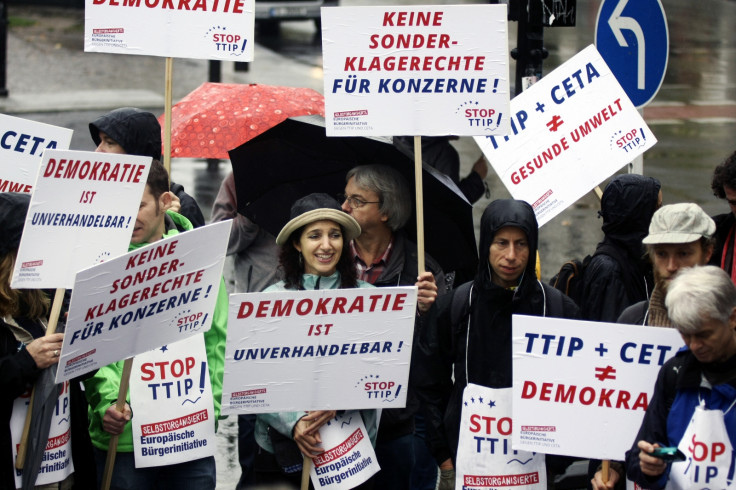European Commission Served with Lawsuit over TTIP and Ceta Negotiations

A group of anti-free trade groups have filed a lawsuit against the European Commission over its failure to publically review its policy over two wide-reaching trade deals.
The "Stop TTIP Coalition" served papers at the European Court of Justice, after the commission blocked a request to use a European legislative tool to review its policy on the Transatlantic Trade and Investment Partnership (TTIP – the trade deal being negotiated between the EU and US) and the Comprehensive Economic and Trade Agreement (Ceta – the Canada-EU deal).
The campaigners say the deals have been negotiated without democracy and transparency. TTIP would be the largest free trade agreement in history, removing tariffs and harmonising legislation between the world's two largest trading blocs.
Ceta has already been finalised and after up to two years of "legal scrubbing", will pass to the European and national parliaments for ratification.
While some estimate that bilateral trade could be boosted by up to 20% and could be worth a combined $20bn to the respective economies, others have questioned the fact that parliamentarians have not been privy to negotiations and will only get to vote on the final text, agreed, essentially, behind closed doors.
The 300-group coalition proposed that the commission hold a European Citizens' Initiative (ECI) – a major development of the Lisbon Treaty, which is designed to make the commission more accountable to the general public. The groups demanded that negotiations and ratification are stalled until this has been complete.
An ECI is described by the European Commission's website as:
"An invitation to the European Commission to propose legislation on matters where the EU has competence to legislate. A citizens' initiative has to be backed by at least one million EU citizens, coming from at least seven out of the 28 member states. A minimum number of signatories is required in each of those 7 member states."
Had the ECI been accepted, the commission would have been obliged to hold a hearing in the European Parliament to discuss its negotiating policy.
The petition acquired the requisite numerical criteria, but the European Commission said in September that because the negotiating process is not bound by EU law, it is thus not territorially applicable to ECIs. It is only once the negotiations are complete and the agreement is finalised that an ECI can begin.
An official response to the initial petition read:
"The negotiation of an international agreement precedes and prepares its signature and conclusion. The council decision authorising the opening of negotiations is therefore a preparatory act with respect to the council decisions authorising the signature and conclusion of an international agreement, which are adopted on the basis of commission proposals.
"As such, it deploys legal effects only between the institutions concerned without modifying EU law. Such modification occurs only once the result of the negotiations, i.e. the international agreement, is signed and concluded."
Opponents argue that the ECI is relevant because once a deal has been agreed, it passes to the European Parliament and national parliaments as a finished document, with votes for or against, without any chance to alter the agreement.
A second online petition to try to start an ECI has – at the time of writing – attracted more than 864,000 signatures. A spokesperson for the World Development Movement, one of the coalition members, told IBTimes UK that they are confident that they have served up a "meaty" legal case, but that it could be two years before any resolution is reached.
Supporters of the TTIP and Ceta agreements have defended their level of transparency and dismissed fears over the potential lowering of standards.
At an event in London last week, Portugal's Secretary of State for Europe Bruno Maçães defended the negotiations, saying opponents are "Irrational, oblivious to normal logic but also quite smart".
He added: "There is nothing secret: it is the most transparent negotiation ever. It is in the newspapers every day. Tens of thousands of documents on the European Commission website are available."
The debate over the transparency of Europe's free trade negotiations has reached the mainstream media and political stage in recent months. In October, the Labour MP Geraint Davies presented the International Trade Agreements (Scrutiny) Bill to Parliament, which proposes more transparent negotiations and which would "empower Parliament to amend international trade deals which threaten a country's democratic interests.
Davies said: "I support encouraging international trade with the many jobs that it creates and of course businesses should be able to invest with confidence in Britain. But TTIP gives corporations the right to subvert the democratic process and sue governments just for enacting laws that they disagree with.
"That's why I've proposed a Scrutiny Bill to bring these treaties back under the control of our Parliament to be examined by British MPs, as opposed to bureaucrats in Brussels.
"There are real concerns about democracy, public services and British sovereignty and my Bill will ensure that both TTIP and other trade treaties receive the careful scrutiny that they deserve and not the free-for-all that the European Commission seems content with."
© Copyright IBTimes 2025. All rights reserved.






















